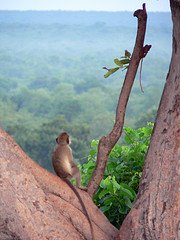So if you take a monkey from his or her mother and make faces at it, sometimes they make similar faces back at you. But just for a week and a half or so. Hmmm. I wonder how many hundreds of thousands of dollars that cost. If one were really interested in social imitation, wouldn't one watch babies with thier own mothers instead of a monkey? Would a human baby imitate a monkey model?
For example. sticking the tongue out isn't a common monkey facial gesture (there are some species for which tongue antics constitute a mating signal, but I don't think it's the macaque). Lip smakcing is common, and it was imitated. Open mouth was not imitated. An open mouth, depending on how it is portrayed, is a threat...would it be wise to learn to respond to an open mouth threat with an open mouth threat as a baby?
Taking a baby from his mother is undeniably traumatic. What was done to these 21 baby monkeys? How did they respond to maternal separation? How did they respond to the manhandling and the procedure? That certainly needs to be taken into account when considering these results. Would a human baby ripped from his mother imitate an ape or monkey? Would we care?
When baby monkeys must be raised in a nursery environment for a clinical reason (e.g. the mother died) they are normally in an incubator during the first month of life (or thereabouts). These babies were subjected to batteries of tests on a daily basis during a time when they were particulalry vulnerable. This all seems like a terribly cruel way to treat baby monkeys to answer a rather nonsensical questions - particularly because one might be able to make relevant observations of wild or free-ranging animals to answer them.
Baby monkeys belong with their mothers and monkeys belong in their natural habitats.
Social imitation in neonatal monkeys
Sep 4, 2006
Social imitation in neonatal monkeys
posted at 8:59 PM
Hotlinks: DiggIt! Del.icio.us
Subscribe to:
Post Comments (Atom)


0 Comments:
Post a Comment